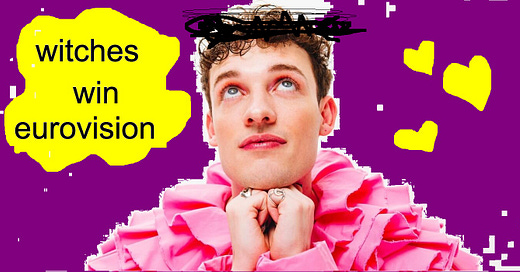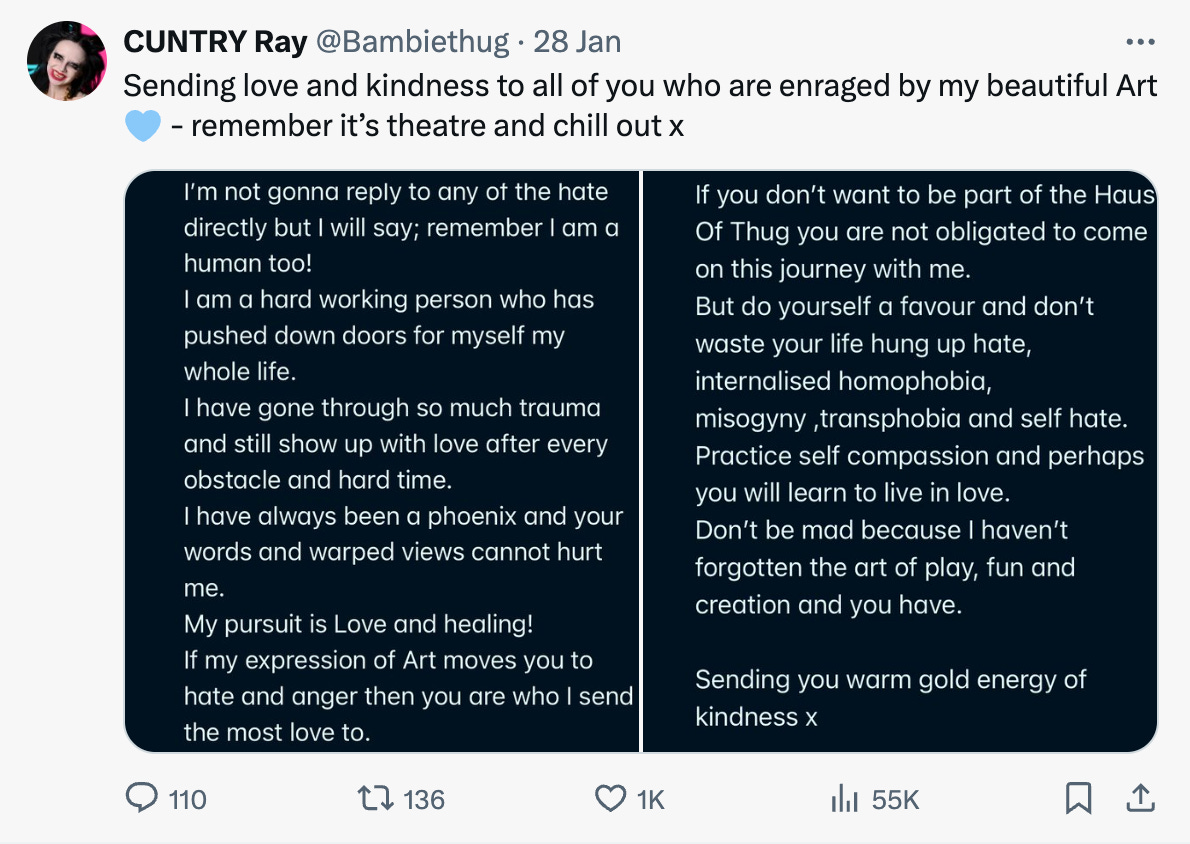Previously on The Priestess Diaries, my last essay, You are Here to be Heard, ended with a hint of Eurovision musings that I promised to expand upon. Here is that expansion.
I have lived in the UK for 14 years, but this year was the first time I’d watched the Eurovision from start to finish, scrambling for a notebook partway through because - hold on - this is my new favourite thing.
Arts contests date back to ancient Athens, when an annual playwriting competition was held in honour of Dionysus Lenaios. These days, we have the annual Eurovision Song Contest, an international singing competition.
Famously silly, melodramatic, and just a bit of fun, this year’s Eurovision was ripe with controversy. Protesters surrounded the venue over Israel’s being allowed to compete. Artists and viewers were pressured to boycott, and nine participating contestants signed a letter calling for ceasefire in Gaza (Wiwibloggs).
I am of the opinion that the show must go on.
The Eurovision provides the stage, and the artists present their art. Real art never lies. When a performance does not quite have heart, it is apparent. When art is true, it changes the world. A contest involving voting, let alone countries competing against each other, is going to be political, whether it claims to be or not.
The contest started with a Dionysian procession of artists (or as it’s officially know, the ‘flag parade’), during which I caught my first glimpse of Ireland’s artist, Bambie Thug, holding banner that screamed CROWN THE WITCH. I was like, wow, mwahahaha that was allowed?! I later read that they were asked to remove body paint that said “Ceasefire” written in Ogham. The European Broadcasting Union (EBU) okay’ed the witchcraft though.
Witchcraft can be used for a cause, but innately, it is simply a reclamation of personal power.
Bambie Thug’s Electro-pop performance Doomsday Blue spanned genres, with goth aesthetic, revealing an outfit in the colours of the transgender flag. Looking at the lyrics later, I found the words Avada Kedavra at the start, and put together that this is not just a song, but a spell. A hex, performed on the New Moon. On usage of ‘Avada Kedavra,’ Bambie Thug has said:
(JKR was not happy about this).
I was surprised that Bambie Thug scored so well, for such a provocative performance, although they did not win. When the votes came in, one country at a time, it was clear that Nemo of Switzerland was the favourite. Nemo’s performance of The Code was bright, bold, and joyous, and easy for the general public to bop along to — without realising that this too, was a spell.
Here’s some background on Nemo’s merch site for The Code:
“The Code” is not just a song, it’s a place where each person can find their truth. Nemo’s truth lies somewhere between the 0s and 1s of the binary system. Nemo’s personal story has become a universal narrative – a coming-of-age story that celebrates self-love. A call to all to crack their own code and step into the kingdom of authenticity.
Every time the camera panned to dear Nemo, their eyes lit up in wonder and gratitude, an irresistible magnetism. My favourite part of the night was watching singers from other countries flock to Nemo to hug them when their country voted for them. I hadn’t realised what their song was about, until I saw them waving the non-binary flag as the results were read. (“I had to smuggle my flag in because Eurovision said no. I did it anyways,” said Nemo to The Guardian).
When Nemo won, Bambie Thug removed their own crown and placed it on Nemo’s head. When Nemo performed and accepted their trophy, as the first non-binary winner of Eurovision, they wore the witch’s crown. Ireland did not win. But the witches won.
When Nemo performed and accepted their trophy, as the first non-binary winner of Eurovision, they wore the witch’s crown.
I am non-binary and, and I don’t know how I feel about my pronouns, although I do prefer the title Mx (pronounced ‘mix’ or, I also like to say the letters ‘m-x’). I do find they/them pronouns to be harmonious. When we pluralise, we include. We recognise the collective we are a part of. It is like ‘the royal we’ except we all get to have it.
I am non-binary, although it’s an imperfect term, because I don’t want to be ‘non’ anything.
I don’t love collecting labels, but doing so makes my expression simpler to convey. The alternative is to describe my experience, and often to convey that, I must contrast my experience to what is accepted as ‘normal,’ and this is disempowering. But when non-binary witches win Eurovision, for one night, I feel a burst belonging.
The tiring thing is accusations that those of us weirdos are doing this to stand out and draw attention to ourselves and cause problems. I’m a Leo; I know what it feels like to make things about me. This is not one of those things. This is my Saturn in Aquarius talking. This one is for the team. Team Humanity.
I hate feeling like I’m bothering people with my differences. I must remind myself that the problem is not my differences, but that society was not built to include them. We are rebuilding that society now, and there are growing pains. If you, as an ally, find it challenging to keep up with the ‘correct terms’ to use, consider how challenging it is for marginalised people. I am still learning the words that help people understand me better. I am so tired of doing a research project every time I find a word that resonates.
I would prefer a world where I didn’t have to research my identity and could just be. That world is attainable.
I muster energy to build that world. It’s not so much to ask for. Just know that when you join in, when you commit to listening - to others and to yourself - you are building that world too.
I feel that some of us androgynous folks have been placed on this planet right now, squirming in the binaries, to question where lines are drawn and who they are serving. For the most part, gender division is in service to toxic masculinity. Toxic masculinity is harmful to all people of all genders.
There is a time and place for gendered terms, just not as many times and places as our society currently upholds.
When Eurovision’s UK commentator Graham Norton goes out of his way to call the female performers 'female artists’, it feels reductive. We only get a few sentences of commentary about each artist. It’s unnecessary. The male artists get to just be artists. For some singers, gender binaries are relevant to their song. Like Spain’s Nebulossa, whose song Zorra was a reclamation of the Spanish word for ‘vixen’, which is used in a vulgar, derogative sense. Bringing up gender divisions every time a woman is onstage reduces the impact of when exploration of women’s rights is relevant to the performance.
The witches won Eurovision, and when the witches win, we all win.
The Code is a catchy tune, with a visually gripping and impressive splashy performance, and that probably earned it most of its votes. But if you listen to the lyrics, and what Nemo is all about, it is also a spell. That spell is working. It created a channel through witch - oops, typo - through which - I could tell this story. A vote for Bambie Thug is a vote for witches, and seeing them highly rated by the public shifted something in me, signalling that it is safe to be seen.
That said, on the night, I voted for France.
I voted for Slimane, France’s contestant, because I could feel his soul through his voice. His song, Mon Amour, radiates the power of love. When he stepped away from the microphone, he reminded us of the innate power of the voice, free from technology or special effects. The voice alone, from body and spirit, resonates in waves that carry across oceans. I voted for him because it was pointed out to me that, sadly, it might be hard for a Person of Colour to win. This fired me up enough to face my fears and make a PHONE CALL to vote. I am a bit embarrassed to admit that I also voted for France because I thought the non-binary witches couldn’t win, but maybe this man with a beautiful mesmerising voice could. I voted for France because he represented what resonated with me at that moment in time, which was that I too wanted to be heard. And when the witches won, I felt like I had been.
As soon as Nemo won, they used their platform to call upon Switzerland’s government to accept a third gender. They said, “In Switzerland there’s no entry for third gender. And I think that’s absolutely unacceptable. We need to change that” (The Guardian).
So take the mic. Take the stage.
Throw away the mic, in front of the world, and show how loudly your voice can be heard. I think about the artists who sidestepped controversy and didn’t show up. I don’t know their songs. The Eurovision is ‘just for fun’, and what is more seductive a force than fun? When something is fun and easy, an audience will gather and feel safe to tune it[s spell]. It’s hard to watch news of war and devastation, but viewers will watch the joyous love fest that is this silly show. All eyes on Eurovision, the most powerful platform on the continent (Indeed, Eurovision 2024 broke the record for global viewing figures (NME)).
The witches prevailed at the Eurovision, and so love prevailed. With Bambie and Nemo seated front and centre as the results came in, celebrating together, inviting more artists to their corner of the results room, it became safe to celebrate, and safe to be seen.
X






